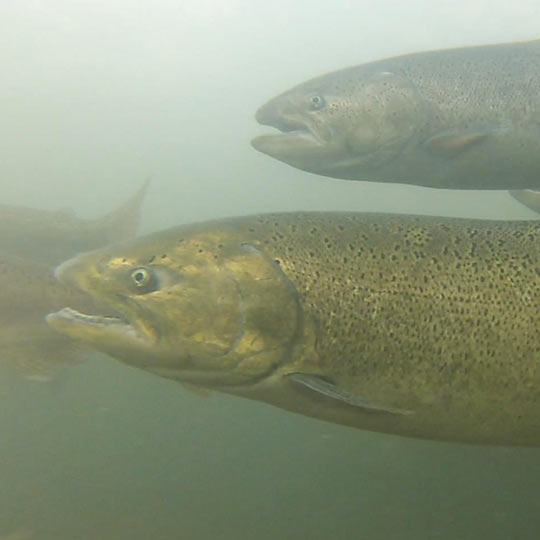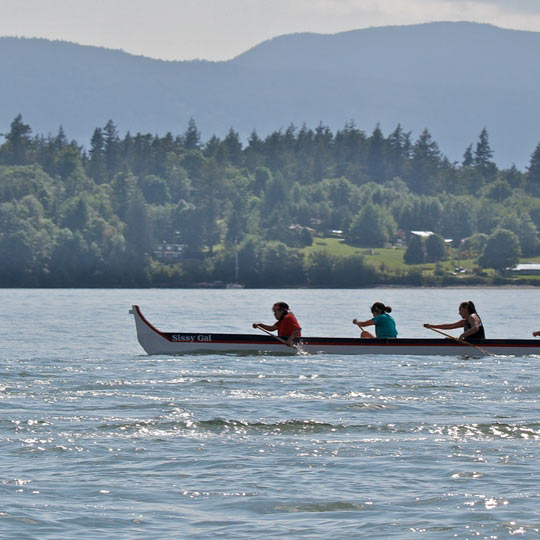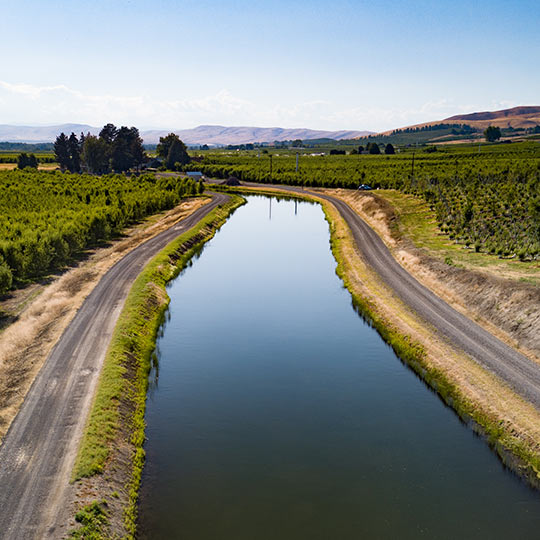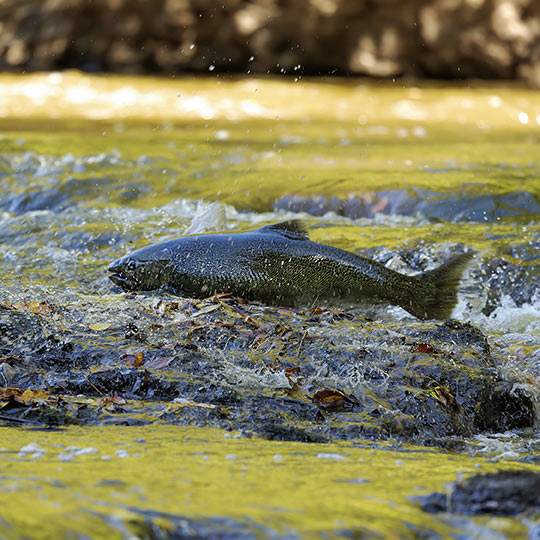Salmon Need Water: How an Adjudication Helps Salmon, Fishing, and Farming
Adjudication is a process where a judge looks over the water claims in a basin, considers how much water is available, and then determines who has a right to water, and to how much.
Adjudication: the act of judging a case…or of making a formal decision about something.
– Cambridge Dictionary
“A water right adjudication is a legal process to resolve conflict and competition for a water source. Adjudication legally determines whether each water right in a water body is legal, how much water can be used, and its priority during shortages. A watershed-wide adjudication prioritizes each individual water right, including federal, tribal, and instream flow rights, under Washington’s prior appropriation framework. When there is not enough water for everyone, the water users who have been using the water for the longest time have priority.”
- Washington State Department of Ecology
For more information see the Washington Department of Ecology Website
Salmon
Salmon need cold, clean water in streams and in the river. The problem is that too much water is withdrawn from streams, wells, and the river throughout the Nooksack basin and many water users don’t have a legal right to the water. As a result, some tributaries go dry in late summer when salmon need water to swim upstream.
While salmon need sufficient stream flow to complete their entire life cycle, we tend to focus on the summer months when stream flows are most limiting and the demand to use that water out of the stream is greatest (i.e. irrigation). Low stream flows can block migration into spawning areas, dry up redds (salmon nests), limit the amount and reduce the quality of available habitat, and lead to high water temperatures and low dissolved oxygen.
Farming in Whatcom County
People in Whatcom County value the fruits, vegetables, nuts, dairy products, and meat produced on Whatcom County farms whether it’s consumed here or shipped elsewhere. Fortunately, according to data from the United States Department of Agriculture, we remain a county with a healthy farm economy.
- Farmland remains over 100,000 acres, the goal for Whatcom County(1)
- The total number of farmers doubled, from 1,485 to 2,982(2)
- Younger people are becoming farmers. In 2002 there were 45 farmers from age 25-34 and by 2017 there were 204.(3)
- Per farm income increased 66% between 2012 and 2017(4)
But like any business, farmers include markets, consumer preferences, environmental changes, and profitability in their farm decisions and over time make changes to what they produce. Here are notable shifts in production(5):
- Milk and other products dropped from 68% of Whatcom sales to 50%.
- There are fewer dairy farms between 2002 to 2017. But the value per cow went up 52.3% and the value of dairy products increased by 21.8%.
- Fruits, trees, nuts and berries moved from 8% of Whatcom’s ag economy to over 32%.
- Total berry production increased by 43% from 2002 to 2017, largely due to an increase in blueberries.
- Direct to consumer sales increased.
The concern we hear from farmers is that adjudication, and the process of getting a legal right to use water, may harm their business. The Yakima basin went through a lengthy and complicated adjudication and it seems that if adjudication is harmful to farming, that impact would show up in the USDA data from Yakima. Instead, farming in Yakima appears to be thriving.
Farming in Yakima increased during the adjudication in the Yakima basin
You can read how farming in Yakima increased during the adjudication here.
Here are the highlights:
- Irrigated farmland increased from 247,313 acres to 260,023 acres.
- Land in farms increased from 1,612,399 acres to 1,781,463 acres
- Market value of ag products increased from $498,067,000 to $1,988,027,000. This is an increase over the rate of inflation by 54%
- Average per farm market value increased from $117,496 to $673,451. This is an increase of 38% over the rate of inflation.
In Yakima the adjudication led to projects that benefited both fish and farms. That can happen in the Nooksack basin too
The Yakima adjudication has led to substantial federal and state grants for water conservation and storage and it seems very likely that an adjudication of the Nooksack basin will create similar opportunities.
A recent article in Irrigation Leader Magazine highlights the Sunnyside Valley Irrigation District (SVID) . The Yakima Adjudication was filed in 1989 and in 2003, during that legal process, SVID reached a settlement with Ecology, Reclamation, and the Yakama Nation. As a result, SVID has embarked on a large water conservation project, 82.5% funded by Federal and State grants.
This was the most complex claim in the adjudication and Ecology Director Fitzsimmons stated, “Money that would have been spent on arguing can be spent on making sure there’s ample water for all of our needs(6).”
It is worth noting that those involved in the adjudication have reported reduced conflict, increased certainty and value to water rights holders, and greater trust and cooperation among disparate interests in the Yakima watershed(7). Today, as a result of the adjudication, the Yakima Basin Integrated Water Management Plan meets regularly and with a high level of cooperation on projects.
The manager of the Roza Irrigation District, Scott Revell, said, “We have a degree of certainty and it is not just fighting at all costs(8).”
In 2017, towards the end of the adjudication, an article in the Yakima Herald-Republic wrote:
“It also helped set the stage for what’s ahead — a push for funding for new storage to insulate the basin from future droughts, led by a broad coalition of interests, including irrigators, the Yakama Nation, and state and federal agencies.
Reichman, (Alan Reichman was senior council with the Washington Attorney General’s Office representing the Ecology Dept.) agreed that the Yakima River Basin is now far ahead of other basins in the West where conflicts over water remain unresolved in the face of looming issues like climate change and its potential impact on water supplies. “It led to a level of cooperation to move forward for all interests to improve the future for irrigation and more water meant to stay in the river.” he said. “A lot has come out of the adjudication that led to where we are today.”
There are differences between the Yakima and Nooksack watersheds, and certainly the Yakima case with 6,150 square miles, three counties and the involvement of the Bureau of Reclamation was more complicated, but in the end resolving water rights through the adjudication led to benefits for farmers and for fish.
That can happen in the Nooksack basin too.
Legal water rights add value to farms
Farms without legal rights to the water they use are a higher risk to lenders, and the only way to fix that is to get a legal right to water. Adjudication is the only path. As an added benefit, the water right itself increases the value of the land. According to Dr. Troy Peters of WSU(9), “Water rights can increase property values 5-10 times.”
Attorney Jordan Ramis in ‘Water Rights Issues in Agricultural Lending(10)’ writes about the concern lenders have with unadjudicated water rights under ‘Latent Problems’ on his website, highlighting both unadjudicated rights and unquantified Federal reserved rights and tribal rights as concerns for lenders. He goes on to write, “The water rights add value to the real estate. They are also crucial to the revenue stream in agricultural enterprises. Additionally, the water rights may have independent value apart from their use on the agricultural land.”
An article called, ‘Understanding water rights can get you a better farm loan(11)’ in The Fence Post, Your Trusted Source for Ag News & Information, provides a similar perspective: “Water rights matter to a borrower because they are an asset that provides value and productivity to an agricultural operation.”
(1) Whatcom County Agricultural Strategic Plan, Approved by Whatcom County Council on 8/8/18, Res. 2018-027.
(2) Whatcom County Agriculture Statistics 2017. WSU Extension.
(3) Ibid
(4) USDA Census of Agriculture. Washington State County Data. County Summary Highlights: 1987, 1992, 1997, 2002, 2007, 2012, 2017. https://www.nass.usda.gov/AgCensus/
(5) Whatcom County Agriculture Statistics 2017. WSU Extension.
(6) May 8, 2003, Department of Ecology Press Release, http://www.svid.org/images/SD%20settlement%20press%20release.pdf
(7) Ayer, Tammy, Participants in decades-long water rights case celebrate adjudication with upbeat comments, cupcakes, Yakima Herald-Republic, June 5, 2019. https://www.yakimaherald.com/news/local/participants-in-decades-long-water-rights-case-celebrate-adjudication-with-upbeat-comments-cupcakes/article_a4a6fadb-ec7a-5097-a51d-38a8587b92b8.html
(8) Lester, Dave, Washington’s 40-year water conflict nears its conclusion, Sept. 2, 2017, Yakima Herald-Republic. https://www.yakimaherald.com/news/local/washington-s-40-year-water-conflict-nears-its-conclusion/article_434b3d6a-9073-11e7-b89c-3f8064b92d51.html
(9) Peters, Troy. Washington Water Rights for Agricultural Producers, Washington State University Fact Sheet. FSWR001. June, 2009.
(10) Water Rights Issues in Agricultural Lending. Jordan Ramis. https://jordanramis.com/resources/articles/water-rights-issues-in-agricultural-lending/view/
(11) Zalutsky, Nancy. ‘Understand water rights can get you a better farm loan. December 5, 2015. The Fence Post. https://www.thefencepost.com/news/understanding-water-rights-can-get-you-a-better-farm-loan/
About Us
Yakima Lessons
Frequently Asked Questions
You Can Help. Join Our Email List.
We promise we won’t spam you.




